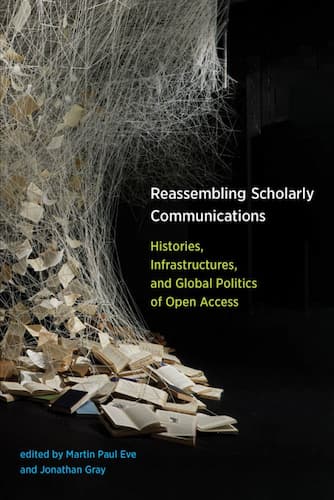reassembling scholarly communication

The book is available here.
blurb
A critical inquiry into the politics, practices, and infrastructures of open access and the reconfiguration of scholarly communication in digital societies.
The Open Access Movement proposes to remove price and permission barriers for accessing peer-reviewed research work—to use the power of the internet to duplicate material at an infinitesimal cost-per-copy. In this volume, contributors show that open access does not exist in a technological or policy vacuum; there are complex social, political, cultural, philosophical, and economic implications for opening research through digital technologies. The contributors examine open access from the perspectives of colonial legacies, knowledge frameworks, publics and politics, archives and digital preservation, infrastructures and platforms, and global communities.
The contributors consider such topics as the perpetuation of colonial-era inequalities in research production and promulgation; the historical evolution of peer review; the problematic histories and discriminatory politics that shape our choices of what materials to preserve; the idea of scholarship as data; and resistance to the commercialization of platforms. Case studies report on such initiatives as the Making and Knowing Project, which created an openly accessible critical digital edition of a sixteenth-century French manuscript, the role of formats in Bruno Latour’s An Inquiry into Modes of Existence, and the Scientific Electronic Library Online (SciELO), a network of more than 1,200 journals from sixteen countries. Taken together, the contributions represent a substantive critical engagement with the politics, practices, infrastructures, and imaginaries of open access, suggesting alternative trajectories, values, and possible futures.
contents
Front matter
Grammatical and Terminological Notes
Acknowledgements
Abbreviations and Glossary
Introduction - Martin Paul Eve and Jonathan GrayI: Colonial Influences
- Epistemic Alienation in African Scholarly Communications: Open Access as a Pharmakon – Thomas Hervé Mboa Nkoudou
- Scholarly Communications and Social Justice – Charlotte Roh, Harrison W. Inefuku, and Emily Drabinski
- Social Justice and Inclusivity: Drivers for the Dissemination of African Scholarship – Reggie Raju, Jill Claassen, Namhla Madini, and Tamzyn Suliaman
- Can Open Scholarly Practices Redress Epistemic Injustice? – Denisse Albornoz, Angela Okune, and Leslie Chan
II: Epistemologies
- When the Law Advances Access to Learning: Locke and the Origins of Modern Copyright – John Willinsky
- How Does a Format Make a Public? – Robin de Mourat, Donato Ricci, and Bruno Latour
- Peer Review: Readers in the Making of Scholarly Knowledge – David Pontille and Didier Torny
- The Making of Empirical Knowledge: Recipes, Craft, and Scholarly Communication – Pamela H. Smith, Tianna Helena Uchacz, Naomi Rosenkranz, and Claire Conklin Sabel
III: Publics and Politics
- The Royal Society and the Noncommercial Circulation of Knowledge – Aileen Fyfe
- The Political Histories of UK Public Libraries and Access to Knowledge – Stuart Lawson
- Libraries and Their Publics in the United States – Maura A. Smale
- Open Access, “Publicity,” and Democratic Knowledge – John Holmwood
IV: Archives and Preservation
- Libraries, Museums, and Archives as Speculative Knowledge Infrastructure – Bethany Nowviskie
- Preserving the Past for the Future: Whose Past? Everyone’s Future – April M. Hathcock
- Is There a Text in These Data? The Digital Humanities and Preserving the Evidence – Dorothea Salo
- Accessing the Past, or Should Archives Provide Open Access? – István Rév
V: Infrastructures and Platforms
- Infrastructural Experiments and the Politics of Open Access – Jonathan Gray
- The Platformization of Open – Penny C. S. Andrews
- Reading Scholarship Digitally – Martin Paul Eve
- Toward Linked Open Data for Latin America – Arianna Becerril-García and Eduardo Aguado-López
- The Pasts, Presents, and Futures of SciELO – Abel L. Packer
VI: Global Communities
- Not Self-Indulgence, but Self-Preservation: Open Access and the Ethics of Care – Eileen A. Joy
- Toward a Global Open-Access Scholarly Communications System: A Developing Region Perspective – Dominique Babini
- Learned Societies, Humanities Publishing, and Scholarly Communication in the UK – Jane Winters
- Not All Networks: Toward Open, Sustainable Research Communities – Kathleen Fitzpatrick
Conclusion - Martin Paul Eve and Jonathan Gray, Bibliography
Contributors
Index